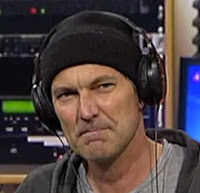 |
| Alia Bland |
She claims to speak for the “ordinary Kiwi” seeking truth, yet her selective outrage, ignoring science while amplifying fear, betrays a knack for cherry-picking facts to suit her narrative. Bland’s no Chantelle Baker, but she’s part of the same choir, dishing up distrust with a side of moral superiority.
Her niche following laps it up, and in the algorithm-driven outrage economy, even minor voices like hers can spark a blaze. While she bangs on about personal freedom, her silence on systemic inequities faced by Māori or other marginalised groups reveals a convenient blind spot in her “every Kiwi matters” mantra. It’s less rebellion than recycled resentment, repackaged for the digital age.
 |
| Alistair Harding |
Alistair Harding lurks in the murky corners of New Zealand’s conspiracy scene, peddling fringe media and anti-government rants like a dodgy street vendor. From 5G paranoia to vaccine skepticism, his content’s a smorgasbord of tinfoil-hat theories, all dressed up as “hidden truth.”
He claims to champion critical thinking, yet his posts lean on flimsy evidence and recycled global tropes, shunning the rigour he demands of “mainstream” media. Harding’s influence is confined to the already-converted, but his relentless churning of divisive yarns keeps the misinformation bonfire burning.
He’s no mastermind, just a cog in the outrage machine, tilling the same tired dirt with a smug nod to “waking people up.” While preaching about government tyranny, he’s curiously quiet on corporate power or historical injustices that don’t fit his opaque narrative. It’s a classic case of shouting “freedom” while picking and choosing whose freedom counts.
 |
| Chantelle Baker |
She claims to stand for truth and transparency, yet her pivot from reality TV to right-wing rabble-rouser reeks of a grift, peddling outrage to punters spoiling for a scrap. Facts and nuance get the boot as Baker sticks to her disinformation narrative, bugger the evidence.
While she crows about protecting Kiwi freedoms, her silence on issues like Māori rights or social equity exposes a selective sense of justice. Her posts fuel division, not solutions, and her cult following eats it up like the idiots they are, proving that in the digital age, a loud voice and a shaky grip on reality can still pull a crowd.
 |
| Don Nicolson |
He claims to stand for fairness, yet his selective outrage skips over climate change realities or historical land disputes that don’t suit his bigoted narrative. Nicolson’s rhetoric paints farmers as victims of a woke conspiracy, but his push for deregulation often ignores the environmental fallout that hits rural communities hardest.
While he goes on about protecting the “backbone of NZ,” his racist dismissal of Māori rights and Treaty obligations reveals a narrow view of who counts as Kiwi. It’s less a principled stand than a megaphone for grievances, dressed up as folksy wisdom, keeping the rural right fired up without offering any real solutions.
 |
| Matt Shelton |
He claims to champion science and patient choice, yet his cherry-picked “evidence” and scaremongering lean more on fear than facts, undermining the public health he once swore to protect. Shelton’s rants about government overreach conveniently ignore the societal cost of misinformation, like strained hospitals or vulnerable communities hit hardest by pandemics.
While preaching about truth, he’s cozy with fringe groups pushing 5G conspiracies. It’s a textbook case of expertise gone rogue, where a doctor’s title becomes a prop for headlines, not healing, leaving Kiwis to navigate through the disinformation.
 |
| Samantha Bailey |
Investigated by the Medical Council for misinformation, she cried foul about her free speech, but her “truth-telling” sidesteps the harm of scaring punters off life-saving jabs. Bailey’s rants about government overreach also ignore systemic issues like Māori health gaps, revealing a narrow view of what “health” really is.
Her pivot from medicine to media grift keeps the anti-vax crowd hooked, but it’s less about facts and more about trying to get headlines. In NZ’s misinformation wars, Bailey’s proof a white coat and a webcam can amplify bunkum, even when the stakes are deadly.
 |
| Sue Grey |
Her relentless spruiking of unproven treatments and baseless claims about government overreach has emboldened a fringe following, while her legal stunts, often dismissed by courts, waste public resources. Her posts expose her as a figure entrenching divisive rhetoric, with some accusing her of aligning with globalist agendas she claims to oppose.
Grey’s antics aren’t just misguided; they’re a dangerous distraction from genuine issues, undermining trust in institutions while offering nothing but noise and no solutions.
 |
| Hannah Spierer |
A former Green activist, she now spins conspiracies about vaccines and Māori rights, claiming to protect New Zealanders while stoking division with debunked narratives. Her “truth-seeking” bravado, seen in fiery speeches at protests, ignores the harm of spreading objectionable material, as noted by the Chief Censor.
Spierer’s pivot from lefty roots to right-wing rabble-rouser reveals a selective sense of justice, loud on government tyranny but silent on historical inequities or communities social inequalities. She’s not exposing truth, she’s fueling outrage, banking on chaos to keep her fringe platform humming.
 |
| Kelvyn Alp |
Alp’s knack for playing the rebel journo is undermined by his shaky grip on evidence, peddling narratives that crumble under scrutiny. While he shouts like a madman about government tyranny, he’s curiously quiet on corporate power or historical injustices like Māori land loss, which don’t fit his “freedom” spiel.
It’s less a form of journalism and more a type of dog barking at a carnival, flogging fear to punters who are too stupid to find out the truth for themselves. In New Zealand's outrage economy, Kelvyn Alp is proof that a loud voice and a dodgy webcam can still pull a crowd, even if the message is complete rubbish!
 |
| Leah Panapa |
She claims to foster open debate, yet her “just asking questions” excuse has worn thin, barely covering up her bigoted viewpoint. Panapa’s less in-your-face than some, but her platform amplifies resentment, giving airtime to callers who see “woke” conspiracies everywhere.
While she bangs on about fairness and free speech, her silence on systemic issues like Māori inequality or colonial legacies reveals a selective lens. It’s a masterclass in dog-whistling, where a matey tone and a knack for dodging accountability keep the talkback crowd nodding along, no questions asked.
 |
| Martin Devlin |
Martin Devlin, the sports broadcaster with a gob that runs faster than a rugby winger, loves playing the everyman hero on NZ’s airwaves. His rants often veer from rugby scores into culture war territory, slagging off political correctness or “snowflakes” with all the subtlety of a bulldozer.
He claims to champion fairness and straight talk, yet his verbal grenades at marginalised groups, like Māori or trans people, reveal a selective sense of who deserves a fair go. Devlin’s blokey charm pulls in the punters, but his playbook is predictable: amplify outrage, dodge accountability, and repeat ad infinitum.
While he bangs on about keeping sports pure, his willingness to wade into divisive social issues with half-baked takes undermines his “just a sports guy” persona. It’s a classic case of a broadcaster using his platform to fuel culture wars, all while pretending he’s just calling it like he sees it.
 |
| Maurice Williamson |
From his early days as “Mr. Pakuranga” to his ministerial roles under John Key, Williamson’s championed deregulation and individual liberty. But now he's more comfortable attacking the very political parties who uphold these values. His selective outrage, railing against government overreach while sidestepping issues like Māori land rights or systemic inequities, reveals a narrow view of “freedom” that prioritises the privileged.
Now a pundit and occasional provocateur, he keeps the conservative base buzzing with disinformation columns and talks that blend wit with a staunch defence of the status quo, proving he’s still a showman, even if the script feels dated.
 |
| Michael Laws |
He also claims to speak for the “ordinary Kiwi,” yet his divisive rhetoric often targets the marginalised, ignoring systemic issues like Māori dispossession that don’t fit his bigoted narrative. Laws’ knack for turning outrage into a personal brand is almost admirable, if it weren’t so transparently racist.
While banging on about free speech and fairness, his selective silence on historical injustices or social inequities reveals a conveniently narrow view of justice. He often mistakes being offensive for being insightful, keeping the culture wars simmering with his smug, recycled conservatism.
 |
| Paul Brennan |
He claims to foster open debate, yet his questions rarely challenge assumptions, instead teeing up the next rant for the talkback faithful. While he pontificates about giving “ordinary Kiwis” a voice, his platform amplifies divisive narratives that sideline marginalised groups, like Māori or trans communities, without a second thought.
Brennan’s not the loudest in the room, but his quiet enabling keeps the outrage spinning, giving air to gripes that fuel division over solutions. It’s a classic case of a broadcaster playing neutral while stoking the fires of culture wars, all under the guise of “just listening” to the punters.
 |
| Peter Williams |
He claims to represent “ordinary New Zealanders,” yet his selective outrage ignores systemic issues like Māori inequality or colonial legacies that don’t suit his narrative. Williams’ avuncular charm sells divisive ideas as common sense, keeping the conservative faithful cheering along in ignorance.
While blathering on about free speech and fairness, his silence on historical injustices or marginalised communities’ struggles reveals a narrow view of who counts as “ordinary.” It’s a tired act, using his platform to fuel division while pretending it’s just straight talk. In Aotearoa’s conservative drenched airwaves, Williams proves you can sound like everyone’s mate while picking fights that keep the culture wars alive.
 |
| Rodney Hide |
He claims to champion freedom for all, yet his dismissal of Treaty rights and Māori grievances reveals a selective sense of who deserves that freedom. Hide’s knack for dressing up bias and prejudice as principle is admirable, but only for those who are equally as racist.
While he preaches about cutting red tape to save the economy, his silence on corporate greed or environmental costs shows a conveniently narrow lens. The bloke who once danced on TV now tap-dances around accountability, keeping the right-wing faithful fired up with recycled rhetoric that ignores complexities in favour of a simplistic “every man for himself” mantra.
 |
| Steven Joyce |
Once the brains behind National’s “rock star economy” spin, he now flogs free-market dogma through columns and consultancy gigs, slagging off government spending, Māori co-governance, and “woke” red tape.
He claims to champion prosperity for all Kiwis, yet his push for deregulation often ignores the environmental and social costs that hit vulnerable communities hardest. Joyce’s polished dogma masks a predictable playbook: frame every issue as a threat to business, sprinkle in dog-whistle populism, and call it analysis.
While talking rubbish about economic fairness, his silence on Māori land rights or systemic inequities reveals a selective bias. His post-political career is less about insight than keeping the old boys’ club cheering, proving some pollies never stop campaigning, even when they should.
 |
| Wayne Wright Junior |
His arguments, heavy on passion but light on evidence, rarely hold up, ignoring the science that protects the communities he claims to champion. His small but vocal following laps up his rants, but his rhetoric fuels chaos over solutions.
While promoting personal freedom, he’s silent on systemic issues like Māori inequality or historical land theft, revealing a selective sense of justice. Wright’s less a thought leader than a cheerleader for division, shouting about revolution while offering little beyond recycled tropes. In NZ’s political outrage economy, he’s proof a loud voice can still stir the pot, even if it’s empty.
